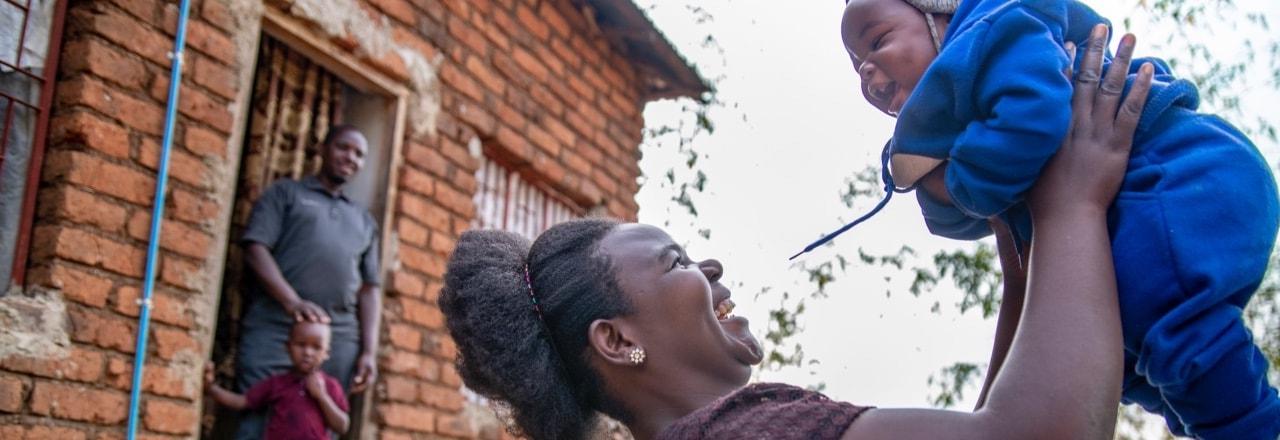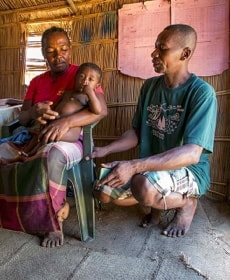About Nutrition
Our Programs
Good nutrition is the foundation for life and central to development and economic growth. Undernutrition is a significant problem in many of the countries where CRS works. In low-income countries, undernutrition is an underlying cause of 45% of child deaths, and a significant percentage of children, adolescents and adults are afflicted by micronutrient deficiencies, which affects immune function, productivity, and compromises human potential. CRS focuses on preventing and addressing undernutrition in all its forms during critical periods in the life cycle including infancy and early childhood, adolescence, and pregnancy. CRS programming is designed to address the immediate and underlying causes of undernutrition, and based on providing support to governments, civil society organizations, communities, private sector actors, and other stakeholders to improve nutrition at scale.
What We Do
In any given year, CRS implements over 20 projects that address malnutrition globally, and is active in Latin America, Sub-Saharan Africa, and Asia. CRS’ nutrition programs range in scope, and include integrated food and nutrition security projects, school feeding programs, and emergency food and nutrition assistance in countries in humanitarian crisis. CRS programming is evidence-based. We implement programs that yield results for families. CRS works closely with governments, civil society organizations including faith-based institutions, communities, and peer agencies to ensure that programs are appropriate and acceptable to the context where they’re implemented.
How We Address Malnutrition
CRS is committed to addressing malnutrition comprehensively and in all its forms. CRS works to address acute malnutrition or wasting, common among crisis-affected communities, chronic malnutrition, which is more pervasive but less visible than wasting, and has deleterious effects on growth and development, micronutrient deficiencies, and other forms of malnutrition including overweight/obesity. People living in poverty are disproportionately affected by malnutrition, and CRS programs work to support the poorest of the poor, providing support to families and communities in fragile contexts.
CRS’ nutrition programming spans five areas of excellence, where we as an agency have a proven track record of strong performance, a wealth of learning, support from donors, and a commitment of our time and resources. CRS invests in rigorous monitoring, evaluation and learning, working closely with universities and research institutions, to expand our own understanding of the most cost-effective ways to address malnutrition, contribute to the global evidence base, and advocate for the populations it serves.
Nutrition Areas of Excellence
CRS works with families and communities to improve nutrition. A community-based approach to improved nutrition includes facilitating a community-wide commitment and action for nutrition. CRS provides training and support to people in the communities where we work; community leaders, extension agents, educators, and men, women, boys and girls who participate in our programs. CRS works closely with individuals and groups who are uniquely positioned to influence and prompt social and behavior change. Our approaches are varied, but may include organizing and training Care Groups, introducing positive parenting curriculum to parents and caregivers of infants and young children, creating Safe Spaces for adolescent girls, and other approaches that position people to act as change agents within their own families and communities.
See CRS’ Social Behavior Change and Gendered Community Engagement Approach in Action:
Changing Food, Changing Habits: Labaladezy and Frankline’s Story – Fararano, Madagascar, 2020 (article)
Optimal nutrition is a reflection of the physical, social and political environment in which an individual exists. The bulk of CRS’ programs take a comprehensive approach to improving nutrition, engaging project participants in activities that improve their livelihoods and well-being. The bulk of CRS’ programs include a body of approaches targeted to the needs and capacities of vulnerable families and households. These programs vary depending on context, but often improve people’s access to nutritious and adequate diets through agriculture or employment, financial services, functional and responsive health systems, water, hygiene and sanitation, and education.
See CRS’ Multi-sectoral Integrated Nutrition Approach in Action:
Home Gardens Support Good Nutrition: Meghan’s Story – India, 2020 (article)
CRS is a major implementer of United States Department of Agriculture (USDA) McGovern-Dole Food for Education (FFE) projects around the world. With decades of experience leading FFE projects, CRS and our partners support governments and schools in their efforts to provide nutritious meals to school children globally. School feeding meets the nutritional needs of children that often would not be met and school meals and take home rations are a critical social protection intervention that foster enrollment, school attendance and academic performance. School feeding programs are not limited to the provision of food or meals. CRS supports the construction and utilization of latrines and hand-washing stations, training on food safety and nutrition education. CRS also supports governments and schools in their efforts to provide other low-cost/high impact interventions including regular deworming and vitamin supplementation. Additionally, CRS works with the parents, caretakers, and communities of school children, providing support to younger children and mothers.
See our School Nutrition work in action:
Meals that Nourish Dreams: Maria Ana’s Story - McGovern Dole, Honduras, 2020 (article)
CRS influences nutrition governance efforts around the world. CRS’s nutrition projects work with our government counterparts to streamline and strengthen the quality of nutrition services that are provided by health facilities and other government institutions. CRS works closely with government counterparts to identify opportunities and best practices to scale successful initiatives to other parts of the country. From conducting a global assessment to identify successes and challenges and formulate actionable recommendations to improve nutrition, to designing interventions that strengthen local governments’ ability to mobilize resources for and execute evidence-based nutrition programs for impact.
CRS integrates research into our nutrition programming so that we continue collecting evidence for our nutrition interventions, can continuously adapt our approaches, and contribute to the evidence base for global health and nutrition programming. Our learning agenda is designed to both test our immediate programming needs and inform our future priorities.
Meet Our Nutrition Staff
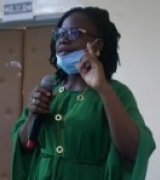
Elisabeth Ouedraogo Boena
Health, Nutrition and School Feeding Program Manager, Beoog Biiga III (BB3) Program, Burkina Faso
“My job is to ensure the establishment of a school feeding and maternal and child health and nutrition program. With this program, we aim to develop early childhood for a better future of Burkina Faso. The integration of the maternal and child health program into school feeding will help prepare children for the best learning conditions by protecting their physical, intellectual and cognitive capacities from the often irreversible consequences of malnutrition. Nutrition is the basis of all development. As they say, we are what we eat. Investing in nutrition is the best way to fight poverty and disease, which are the most recurrent scourges in my country.”
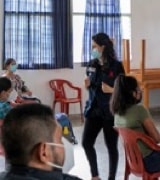
Gabriela Estrada
Health and Nutrition Coordinator, RENACER Project, Guatemala
“My work focuses on facilitating the achievement of the objectives of the health and nutrition sector of the RENACER project and providing technical guidance and advice to staff on health and nutrition. For CRS Guatemala, it is important to help vulnerable families so that they can improve their food security and improve their health and nutrition status. As a health and nutrition team, we provide advice to families so that they can diversify their diet, advice to mothers on care and feeding during the thousand-day window, and advice on hygiene at home. As a result, the prevalence of acute malnutrition and watery diarrhea have been reduced, and families' diets have become more diverse.
I have a personal mission to help people who need it most and mainly to help children who are very vulnerable. I like to work so that the children in Guatemala have good health and good nutrition that are so important to reach their maximum development. Working in community nutrition fills me with great satisfaction.”
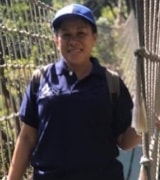
Dr. Ratthiphone Oula
Research and Nutrition Technical Advisor, Applied Nutrition Research Capacity Building (ANRCB) Project, Lao People’s Democratic Republic (Lao PDR)
“ANRCB project supports the Laos Ministry of Health’s Center of Nutrition and two academic institutions to build capacity and quality of nutrition research. I provide the project technical advice, guidance, and leadership to coordinate between US Universities and Lao Government partners to develop and pilot modules in anthropometry and basic concepts of nutrition. I also lead capacity strengthening programming with the government’s Center of Nutrition to improve their day-to-day operations.
My favorite part of my work is improving the coordination and collaboration of the nutrition sector. Through working better together, nutrition stakeholders can support each other, leverage each other’s investments, and reach more at-risk people and communities in Lao PDR. Therefore, I prefer to work with CRS after my retirement because I like the vision, policy, strategy, goals and approach of this organization, and I would like to be one support for communities and vulnerable groups. Additionally, research is my favorite part since it is the way we get useful evidence to convince decision makers and planners to implement good policy for a greater benefit to all. I want to be someone who improves the situation in Lao PDR and helps mothers and their children reach their full potential in the future and so they can lead our country out of poverty.”

Toky Andrianarivo
Community-Led Total Nutrition (CLTN) Program Manager, Madagascar
I am in charge of the administrative, financial and human resources management of the CLTN project implementation team. I am also in charge of supporting the field team in the planning and management of the actual implementation of the activities so that they are carried out according to the standards and respecting the different steps of the approach since it is a research project conducted with Harvard University.
I also support other projects in designing and researching nutrition intervention strategies that align with the national nutrition action plan and represent CRS at the national level in various nutrition-related meetings conducted by the ministry, cluster and other partners.
Nutrition is one of CRS Madagascar's five priority areas, so we mainly target areas where food insecurity prevails and weakens the survival of the vulnerable population and also in areas with a high prevalence of chronic malnutrition. We conduct with CHWs the community management of moderate malnutrition (CMAM), the promotion of infant and young child feeding (IYCF) combined with other interventions related to agriculture, livestock, fisheries, social security, etc. in order to prevent the situation from worsening. Through our monthly monitoring, we have noted a clear improvement in the situation, but there is still a long way to go, taking into account the complementarity with other actors so that there is a synergy of interventions.
What motivates me in nutrition is to bring all my contributions in the fight against malnutrition in Madagascar. To be able to see the impact of our interventions on the beneficiaries we serve and the fact that we contribute through our interventions to improve the nutritional results in our respective areas.
Seeing a malnourished child who recovered after receiving proper care at our community sites is my favorite part about my work. And also the transfer of knowledge with the field team.
Our Impact
Stories
Research & Publications
-
Manuals
Tom Brown Supplementary Feeding Program Implementation Guide
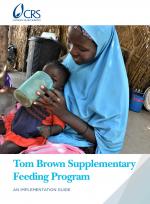
This document provides detailed guidance on the Catholic Relief Services community based supplementary feeding program, Tom Brown, for nutrition actors within or outside of CRS. More
-
Evaluations/Assessments
Father Engagement in Nutrition
A Qualitative Analysis in Muhanga and Karongi Districts in Rwanda
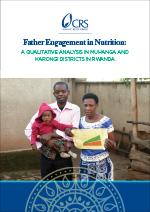
The Embassy of the Kingdom of the Netherlands project to Accelerate Reduction of Stunting of Children Under Two Years (EKN project) targets pregnant and lactating women and children under two years old in an integrated package of interventions to reduce the incidence of chronic malnutrition, or More
-
Papers/Reports
Recipe for Success: Accelerating Nutrition Governance
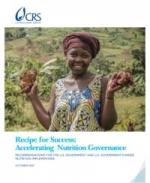
This policy analysis examines how existing U.S. government (USG) policies, systems, and structures enable or hinder the localization of the USG’s nutrition programming, as well as nutrition-specific and nutrition-sensitive approaches implemented by USG-funded nutrition actors. More
-
Manuals
Garden Resource Guide
Supporting Garden Intervention Design and Implementation
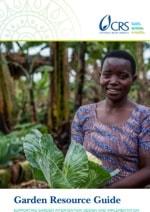
Successful and sustainable garden interventions require expertise from many sectors. The Garden Resource Guide, one resource within CRS’ Garden Toolkit, brings this knowledge together with its 13 chapters that cuts across agriculture, nutrition, behavior change, water resources, gender, post-harvest handling, marketing, behavior change and monitoring and More
